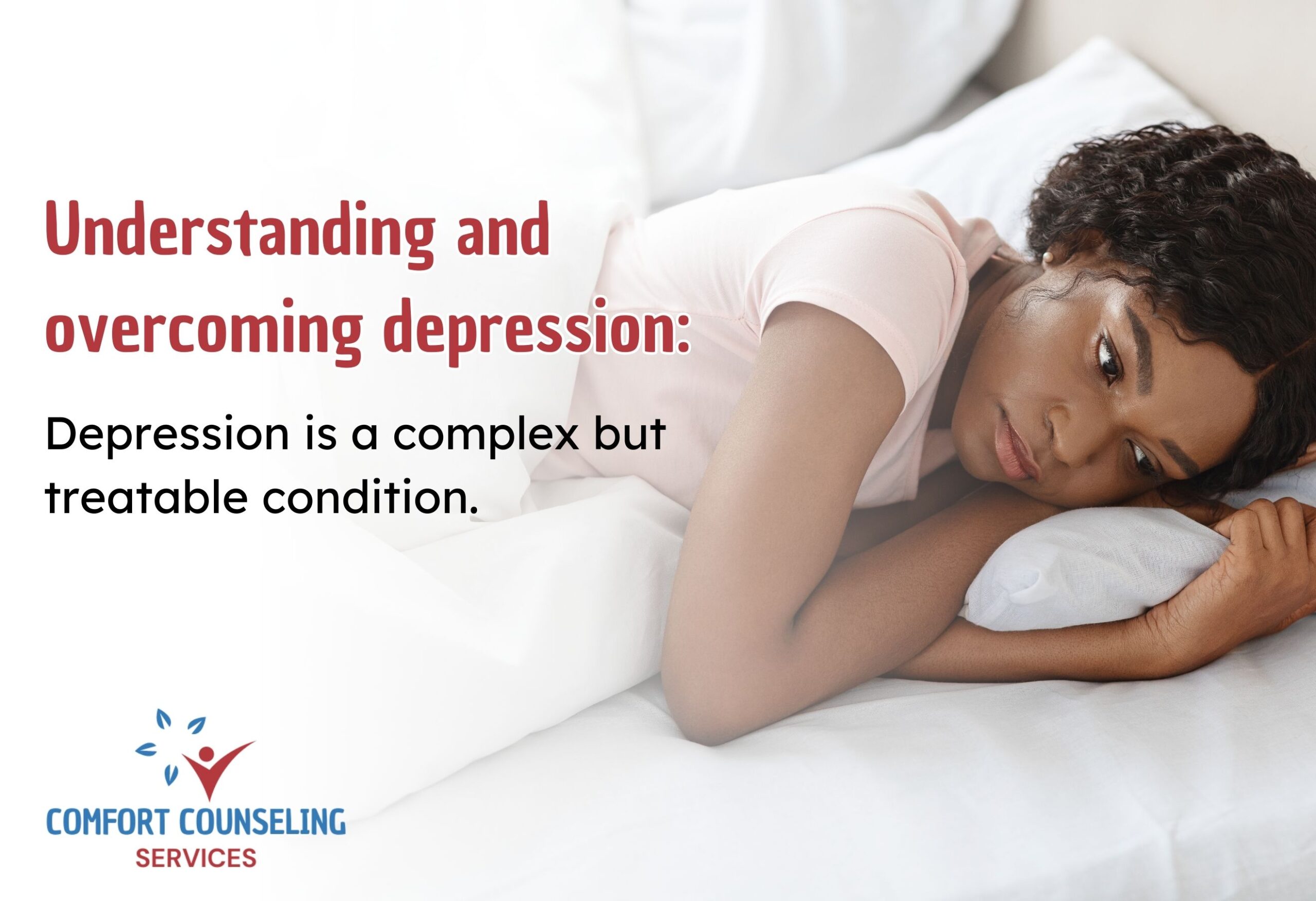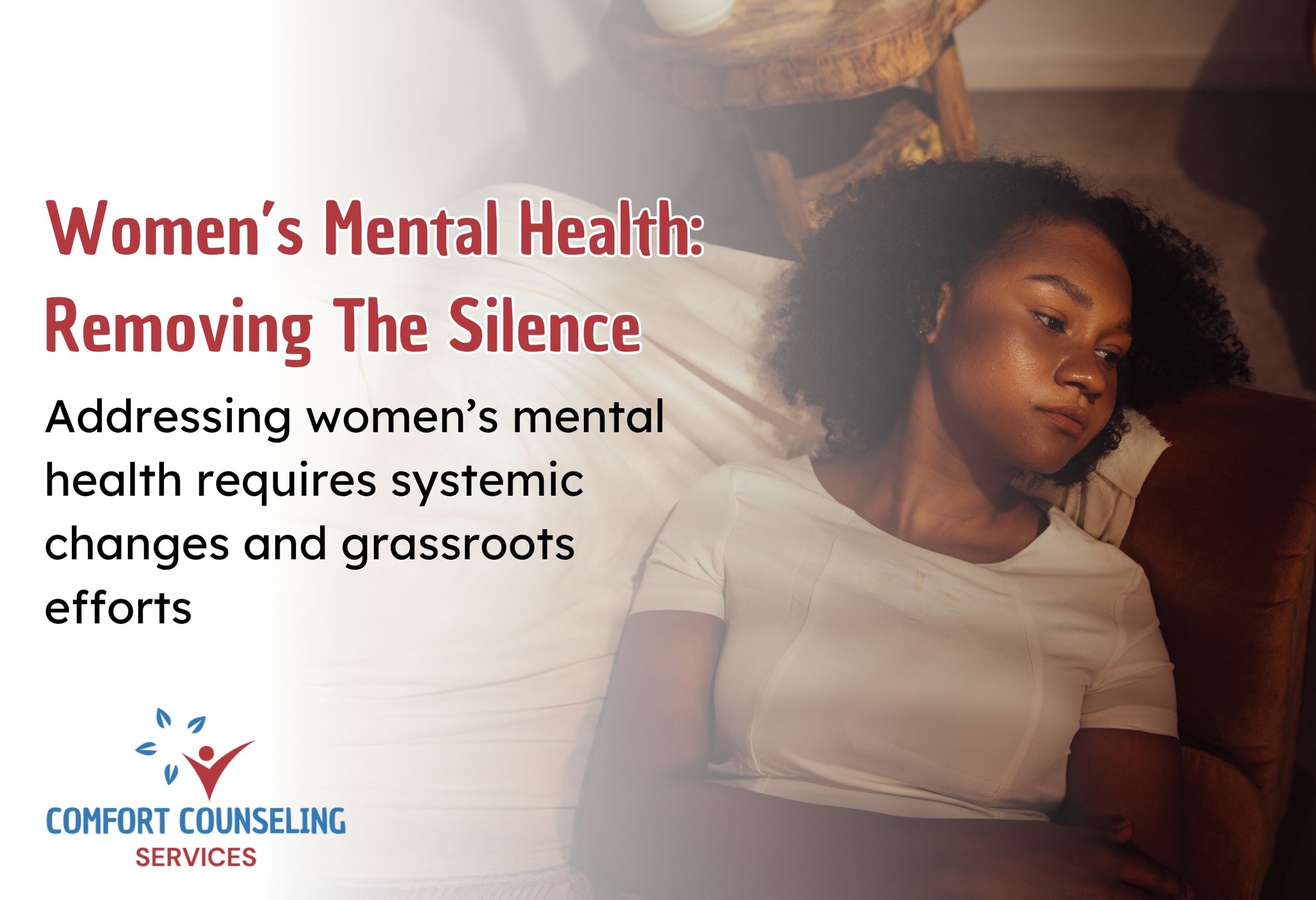A comprehensive guide from Comfort Counseling Services
Depression is a common yet serious mental health condition that affects millions of people globally. At Comfort Counseling Services, we are committed to providing compassionate and effective support for individuals grappling with depression, Comfort counseling offers a comprehensive understanding of depression, its symptoms, causes, available treatments and strategies for managing this condition.
What is depression?
Depression , can be divided into several types like major depressive disorder, is more than just feeling sad or going through a rough patch. It’s a persistent condition that significantly affects how a person feels, thinks and handles daily activities. According to the American Psychiatric Association (2024), depression is a common and serious medical illness that negatively impacts how you feel, the way you think and how you act. Mild or temporary depression may occur to anyone who has experienced a loss of a loved one or abody part or job or has just divorced .This depressions are well handled by qualified professional counselors.
Symptoms of depression
The symptoms of depression can vary from mild to severe and can include:
- Persistent sad, anxious or “empty mood”.
- Feelings of hopelessness or pessimism.
- Irritability.
- Feelings of guilt, worthlessness or helplessness.
- Loss of interest or pleasure in hobbies and activities.
- Decreased energy or fatigue.
- Moving or talking more slowly.
- Feeling restless or having trouble sitting still.
- Difficulty concentrating, remembering or making decisions.
- Difficulty sleeping, early morning awakening or oversleeping.
- Appetite or weight changes.
- Thoughts of death or suicide or suicide attempts ( National Institute of Mental Health, 2024).
Causes of Depression
Depression can arise from a complex interplay of genetic, biological, environmental and psychological factors. Some of the key contributing factors include:
- Genetics: Depression can run in families, suggesting a genetic predisposition to the condition ( Harvard Medical School, 2021).
- Brain chemistry: Imbalances in neurotransmitters, which are chemicals in the brain that regulate mood, can play a significant role in depression.
- Hormones: Changes in hormone levels, particularly during events such as pregnancy, postpartum, menopause or thyroid problems, can trigger depression.
- Life events: Trauma, the loss of a loved one, a difficult relationship or any stressful situation may precipitate depression (Mayo clinic, 2024)
- Medical conditions: Chronic illnesses such as diabetes, cancer, heart disease and chronic pain can lead to depression. Certain medications can also have depression as a side effect.
Treatment options for depression:
Depression is treatable and a variety of approaches can help individuals manage their symptoms effectively. The mainstays of depression treatment include:
- Psychotherapy- Psychotherapy or talk therapy is often a first-line treatment for depression. Cognitive Behavioral Therapy (CBT) is particularly effective in helping individuals identify and change negative thought patterns and behaviours (Beck, 2011). Other types of therapy such as interpersonal therapy (IPT) and psychodynamic therapy can also be beneficial.
- Medication- Antidepressant medications can help correct imbalances in brain chemistry that contribute to depression. Selective serotonin reuptake inhibitors (SSRIs) and Serotonin-norepinephrine reuptake inhibitors (SNRIs) are commonly prescribed antidepressants (National Institute of Mental Health, 2024). It is essential to work with a healthcare provider to find the right medication and dosage.
- Lifestyle changes- Lifestyle modifications can play a significant role in managing depression. Regular physical activity, a healthy diet, adequate sleep and stress reduction techniques such as mindfulness and meditation can improve overall well-being (Harvard Medical School, 2021).
- Support groups- Joining a support group can provide a sense of community and understanding. Sharing experiences and coping strategies with others who are going through similar struggles can be incredibly therapeutic.
- Alternative therapies- Some individuals find relief through alternative therapies such as meditation exercises and herbal supplements. While these should not replace conventional treatments, they can be complimentary options ( Mayo clinic, 2024).
Managing Depression: Practical Strategies-
In addition to professional treatment, individuals can adopt various strategies to manage depression and improve their quality of life:
- Stay connected: Maintain social connections and seek support from friends, family or support groups.
- Set realistic goals: Break tasks into smaller steps and set achievable goals to avoid feeling overwhelmed.
- Create a routine: Establish a daily routine to provide structure and a sense of normalcy.
- Limit alcohol and avoid drugs: Substance use can exacerbate depression and interfere with treatment.
- Stay informed: Educate yourself about depression to better understand your condition and treatment options.
CONCLUSION:
Depression is a complex but treatable condition. At Comfort Counseling Services, we are dedicated to providing the support and resources needed to help individuals overcome depression and lead fulfilling lives. If you or someone you know is struggling with depression, please reach out to us for compassionate and comprehensive care.
References:
- American Psychiatric Association (2024). Depression. Retrieved from APA.
- National Institute of Mental Health. (2024). Depression. Retrieved from NIMH.
- Harvard Medical School. (2021) Understanding depression. Retrieved from Harvard Health.
- Mayo Clinic. (2024). Depression (Major depressive disorder). Retrieved from Mayo clinic.
- Beck, J.S. (2011). Cognitive Behaviour Therapy: Basics and Beyond. The Guilford Press.
By focusing on these aspects, we hope to inspire and support you on your journey toward mental wellness. Join us at Comfort Counseling Services as we prioritize mental health and well-being.



